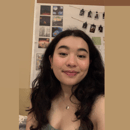People have always told me that it’s a blessing for me to have two different cultures in my life. Being half Chinese and half Egyptian sounds cool and unique on the surface. However, I’m not sure if it’s as wonderful as people think it is.
Growing up biracial, I have always struggled with my identity. My race is an anomaly to most people and I often get asked “what race are you?” or “what kind of Asian are you?”. I have always been lumped into one race or the other, depending on how neatly it fit with the point of view of the person judging me. However, I quickly learned not to get offended by these questions, but rather to understand that they’re a result of human curiosity and not hostility.
Since I don’t look fully Chinese or Egyptian, nor do I speak either language, I felt like I didn’t belong to my own racial groups. Even talking about one culture over the other almost felt like I was appropriating my own culture. Naturally, I found it difficult to find where I fit in. It made me question who I was and where I belonged. Every time I was asked about my ethnicity, it felt like I was having an identity crisis.
According to an article in the BBC, Racial Imposter Syndrome is defined as “a feeling of self doubt when one’s internal racial identity doesn’t match with others’ perception of their racial identity.” After reading this, I realized it was exactly what I had been feeling my whole life.
Despite this detachment, I have always appreciated my heritage and felt equally Chinese and Egyptian. Learning about and participating in these cultures is something I love, yet I still couldn’t ignore the feeling of being lost.
I then began to disregard the worrying thoughts of what other people thought of me and started to think about myself. Rather than looking for acceptance in others, I learned to find acceptance in myself.
Identity is a complicated thing that I don’t think I will ever fully understand, but all I know is that it’s something everyone uses to express and understand themselves. Upon lots of self-reflection, I have developed positive mindsets that allow me to be at peace with myself and focus on my passions and aspirations. While I learn more and more about myself every day, I am also exploring the person I want to become, which I think is one of the most important aspects of my identity.
Being hyper-fixated on how other people saw me led to me feeling like an imposter. Once I stopped letting people’s views confuse me about my identity, I was able to discover my true individuality.
I believe that living a life within the confines of how others define you is a preclusion of your potential; it’s too easy to lose who you are, but when you learn to accept yourself you might find the happiness that has always eluded you.
“Be who you are and say what you feel, because those who mind don’t matter and those who matter don’t mind.”— Dr. Seuss




